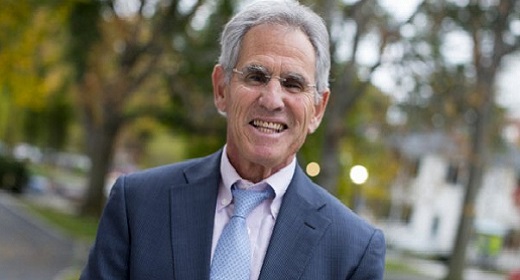by Jon Kabat-Zinn: In the early 1990s, scientist, writer, and world-renowned mindfulness expert Jon Kabat-Zinn encountered Cherry Hamrick…

a teacher in the small town of South Jordan, Utah, who wanted to bring mindfulness—the act of paying attention on purpose in the present moment—into her elementary school. Worried about how a largely Mormon community might react to such practices, Kabat-Zinn told the young teacher not to do it.
“Like any good student, she didn’t listen to me and did it anyway,” Kabat-Zinn said yesterday during a talk at the Harvard Graduate School of Education’s most recent Askwith Forum on mindfulness in education. “It turns out she was brilliant at it, and she was one of the first teachers to bring a lot of these practices into the classroom.”
Hamrick taught mindfulness through techniques such as ringing a bell and having the students slowly raise their hands when they could no longer hear the sound of it; having them carefully eat a small portion of a candy bar and notice the way sugar sparked their taste buds; and setting aside time for “mindful walking,” in which they strolled around the school yard in silence and simply noticed each step. Gaining self-awareness through these types of exercises, Kabat-Zinn pointed out, is crucial to managing stress and finding success both inside and outside the classroom in a world where children are constantly bombarded with technological stimuli such as texts, e-mail, and Facebook.
“Self-distraction is at absolutely epidemic proportions—and it’s not the iPhone, it’s the thought of, ‘I wonder if anybody texted me,’” he said. “There’s always this digital domain—this virtual reality—and kids are even more challenged [to pay attention] than we were when we were young.”
The founding director of the Stress Reduction Clinic and the Center for Mindfulness in Medicine, Health Care, and Society at the University of Massachusetts Medical School, Kabat-Zinn has been a strong supporter of groups like Mindful Schools that use mindfulness to teach children how to focus, manage their emotions, handle their stress, and resolve conflicts. Instead of simply telling children to pay attention, for example, Kabat-Zinn said that adults should show children how to pay attention through direct experience, because that allows them to make wiser decisions in the heat of the moment, rather than only in retrospect. “Mindfulness is like a muscle, and without exercise it will lose its strength,” he said. “Our world is so much about doing that the being gets lost.”
With stress in children in the United States at high levels, incorporating mindfulness into school curriculums is imperative, he asserted, adding that students can tap into “their profound capacity” for awareness if they are taught to do so.
Although Kabat-Zinn pointed out that mindfulness is becoming more mainstream—displaying a chart that showed the number of publications and studies on the subject rising drastically in the last 10 years—he said he hopes it will gain even more steam and become a part of every school curriculum. “Many kids come to school and they haven’t had breakfast, or they’ve seen acts of violence, and [yet] they are expected to learn optimally,” he said. “If you are going to be in an environment like a classroom, why not help [students] actually get into an alignment, calmness, clarity, and emotional regulation where they can be open to what is available for them? Then you create a community of learning.”
HGSE’s Askwith Forums are “a series of public lectures highlighting leaders in a field to share new knowledge, generate spirited conversation, and offer insights into the highest priority challenges facing education.” Kabat-Zinn, who began teaching Mindfulness Based Stress Reduction (MBSR) in 1979 and has written 10 books, including the popular Wherever You Go, There You Are: Mindfulness Meditation in Everyday Life, was introduced by Metta McGarvey, Ed.D. ’10, whose doctoral dissertation research project The Mindful Leadership Study was inspired by his work.




















































